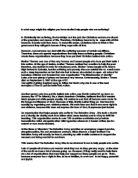Are the absolutely affluent morally obligated to help the absolutely poor? Consider how Rachels and Nozick might respond to Singers argument.
Chrystal Fortugno
Philosophy 102
May 7, 2003
Q: Are the “absolutely affluent” morally obligated to help the “absolutely poor?” Consider how Rachels and Nozick might respond to Singer’s argument.
The question of who deserves what and who owes what to who is a philosophical question that people unendingly attempt to answer, never coming to a universal and workable conclusion. No matter what outcome is decided upon, someone is destined to be unhappy about it, as unhappiness almost seems to be the defining human condition, with someone always being unhappy about something. However, there are a few who have attempted to answer this question in a reasonable and moral manner, such as Nozick, Singer, and Rachels. Each of these people takes a somewhat different approach to answering this difficult question. To begin a comparative analysis of these theories, I will first go over the ideas that Singer represents in “Rich and Poor,” going on to analyze what Rachels and Nozick would say in response to Singer’s argument.
In “Rich and Poor,” Singer’s basic principle is that when something is within one’s power to prevent anything very bad from happening, without sacrificing anything of comparable moral significance, one ought to do so. He uses the example of a professor coming across a drowning child on a way to a lecture. The only thing the professor is sacrificing by saving the life of the child is being late to the lecture or having to postpone it, which is obviously not equal to the life of a child. Singer believes that the idea of property rights leaves too much to chance. For instance, in the case of those who live in Kuwait versus those who live in Chad. Those who chose to live in Kuwait thousands of years ago had no idea that they would come upon innumerable wealth in the form of oil under their sand. Chad was dealt a bad hand in that deal, but do they deserve it simply because of where they chose to reside? The people who live in Kuwait deserve that oil no more than anyone else, according to Singer because it was just dumb luck that they ended up with such wealth. Singer believes that the concept of taking care of our own, above and beyond people in other countries is absurd. To Singer, citizenship should be irrelevant in the question of who deserves something. This preference is a form of ethnocentrism and is comparable to ideas like racism, sexism, and specieism. Singer also touches on the idea of “triage” policies like those used in hospitals in times of war. To this idea, Singer responds by saying that in order to enforce something of this nature, we must consider the probability involved with each outcome that could possibly occur. Singer belies that those in a position of absolute affluence are morally obligated to help those unfortunate people who are victims of absolute poverty.







